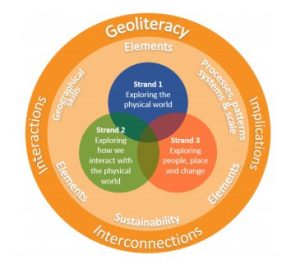Geography
Mission Statement
The Geography Department at Scariff Community College seeks to allow students to develop an understanding and appreciation of their physical and human surroundings. The interrelationships between the physical and human environments will be explored. Students will develop geographical skills necessary to analyse issues at local, national and international levels. Learning through experience is encouraged and the goals of self-esteem, self-discipline and self-fulfilment are promoted.
Subject Aims
The Geography Department in Scariff Community College aims;
- To promote awareness of the spatial patterns of environmental phenomena, both natural and cultural.
• To develop an understanding of natural, social and economic processes.
• To develop an understanding of complex interactions in the world and their constant changes.
• To encourage to be sensitive to awareness of their own country and elsewhere.
• To contribute to students understanding of current issues.
• To encourage students to develop their natural curiosity.
• To develop organised thinking and cognitive abilities.
• To improve numeracy and literacy in all students.
Subject Objectives
Knowledge
Students should be encouraged to develop understanding of the:
• Physical environment
• Social and cultural phenomena
• Interactions and effects of the interactions of physical, cultural, social and economic phenomena.
• The nature and diversity of physical and cultural environments in Ireland and elsewhere.
Skills
Students should develop the following skills:
• Figure Drawing/Interpretation
• Map Drawing/Interpretation
• Photograph Analysis
• Investigative Skills
• Presentation skills
• Communication skills
• Social Skills – e.g. team work
• Information Technology Skills
Junior Cycle:
Geography is a compulsory subject up to the end of the Junior Certificate examination. Three lessons per week are taught from 1st year through to third year.
Junior Cycle Geography focuses on providing students with opportunities to develop the knowledge, skills, values and behaviours that allow students to explore their world. The new Junior Cycle Geography specification was introduced into schools in September 2018.
The study of junior cycle geography enables students to become geographically literate. It develops knowledge, skills, values and behaviours that allow students to explore the physical world, human activities, and how we interact with our world. It stimulates curiosity, creating opportunities for students to read, analyse, synthesise and communicate about their immediate environment and wider world.
Learning Outcomes
The learning to be experienced by students in Junior Cycle Geography is described in learning outcomes. These are statements that describe the knowledge, understanding, skills and values students should be able to demonstrate after their three years of Junior Cycle. There are 28 learning outcomes across the three strands and teachers select learning outcomes from across the strands in first, second and third year.
Structure of the Specification

Geoliteracy
The specification is informed by the concept of Geoliteracy. This refers to students’ ability to develop far-reaching understandings through geographical thinking and reasoning. The core components of Geoliteracy are the three I’s:
• Interactions
• Interconnections
• Implications
Strands
There are three interconnected strands:
• Exploring the physical world
• Exploring how we interact with the physical world
• Exploring people, place and change
Elements
The elements inform how students will experience the learning outcomes within the strands. Students will approach the learning outcomes through the lens of each of the elements.
• Processes, patterns, systems and scale
• Geographical skills
• Sustainability
Assessment and the learning journey
Junior Cycle Profile of Achievement
The assessment of Geography for the purposes of the Junior Cycle Profile of Achievement (JCPA) will comprise two Classroom-Based Assessments. In addition, the second Classroom-Based Assessment will be followed by a written Assessment Task that will be prepared and marked, along with a final examination, by the State Examinations Commission.
Classroom Based Assessment
Classroom Based Assessment 1: Geography in the news
• Structured inquiry through a response to a recent geographical event
• At the end of a three-week period students will report on their inquiry.
• Reports may be presented in a wide range of formats • Completed in the second term of second year
Classroom Based Assessment 2: My Geography
• Structured inquiry into a geographical aspect(s) in a local area
• Students will, over a three week period, investigate an aspect of geography in a local area
• Completed in the first term of third year
After completion of each CBA, a Subject Learning and Assessment Review (SLAR) meeting takes place providing teachers with the opportunity to share samples of their assessment of student work and build a common understanding about the quality of student learning.
Assessment Task
On completion of the second Classroom-Based Assessment, students will undertake an Assessment Task. It will be marked by the State Examinations Commission and will be allocated 10% of the marks used to determine the final examination grade awarded by the SEC.
Final Examination
There will be one examination paper at a common level, set and marked by the State Examinations Commission (SEC). The examination will be no longer than two hours in duration and will take place in June of third year.
Textbooks
Cyclone. Complete Junior Cycle Geography. Stacy Kenny & Andrew Horan. Consultant Author: Charles Hayes
Link to curriculum
https://curriculumonline.ie/Junior-cycle/Junior-Cycle-Subjects/Geography/
Department members:
Mary Kelleher
Alan Deegan
Anna Moroney
Kollette O’Driscoll
Darina Sheridan
